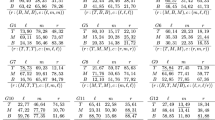Abstract
Evidence presented in Salmon (2001; Econometrica 69(6) 1597) indicates that typical tests to identify learning behavior in experiments involving normal form games possess little power to reject incorrect models. This paper begins by presenting results from an experiment designed to gather alternative data to overcome this problem. The results from these experiments indicate support for a learning-to-learn or rule learning hypothesis in which subjects change their decision rule over time. These results are then used to construct an adaptive learning model which is intended to mimic more accurately the behavior observed. The final section of the paper presents results from a simple simulation based analysis comparing the performance of this adaptive learning model with that of several standard decision rules in reproducing the choice patterns observed in the experiment.
Similar content being viewed by others
References
G.W. Brown (1951) Iterative solutions of games by fictitious play, in Activity Analysis of Production and Allocation Wiley New York
J.N. Brown R.W. Rosenthal (1990) ArticleTitleTesting the minimax hypothesis: a re-examination of O’Neill’s game experiment Econometrica 58 IssueID5 1065–1081
R. Bush F. Mosteller (1955) Stochastic Models For Learning Wiley New York
C. Camerer T.-H. Ho (1998) ArticleTitleExperience-weighted attraction learning in coordination games: probability rules heterogeneity and time-variation. Journal of Mathematical Psychology 42 305–326
C. Camerer T.-H. Ho (1999) ArticleTitleExperience-weighted attraction learning in normal form games Econometrica 67 IssueID4 827–874
Camerer, C., Ho, T.-H., and Wang, X. (1999), Individual Differences in EWA Learning with Partial Payoff Information, mimeo.
Y.-W. Cheung D. Friedman (1997) ArticleTitleIndividual learning in normal form games Games and Economic Behavior 19 46–76
J.C. Cox J. Shachat M. Walker (2001) ArticleTitleAn experiment to evaluate Bayesian learning of nash equilibrium play Games and Economic Behavior 34 IssueID1 11–33
W.K. Estes (1950) ArticleTitleToward a statistical theory of learning Psychology Review 57 94–107
Foster, D. and Young, H.P. (1996), Learning with Hazy Beliefs, mimeo.
Foster, D.P. and Young, H.P. (forthcoming), Learning, hypothesis testing, and nash equilibrium, Games and Economic Behavior.
Hart, S. and Mas-Colell, A. (1996), A Simple Adaptive Procedure Leading to Correlated Equilibrium, mimeo.
R.D. Luce (1959) Individual Choice Behavior: A Theoretical Choice Behavior Wiley New York
D. Mookherjee B. Sopher (1994) ArticleTitleLearning behavior in an experimental␣matching pennies game Games and Economic Behavior 7 62–91
D. Mookherjee B. Sopher (1997) ArticleTitleLearning and decision costs in experimental constant sum games Games and Economic Behavior 19 97–132
R.R. Nelson S.G. Winter (1982) An Evolutionary Theory of Economic Change Belknap Press Cambridge, Massachusetts
M. Nowak K. Sigmund (1993) ArticleTitleA strategy of win-stay, lose-shift that outperforms tit-for-tat in the prisoner’s dilemma game Nature 364 56–58
Y. Nyarko A. Schotter (2002) ArticleTitleAn experimental study of belief learning using elicited beliefs Econometrica 70 IssueID3 971–1005
J. Ochs (1995) ArticleTitleGames with unique, mixed strategy equilibria: an experimental study Games and Economic Behavior 10 202–217
J.W. Payne (1976) ArticleTitleTask complexity and contingent processing in decision making: an information search and protocol analysis Organizational Behavior and Human Performance 16 366–387
Posch, M. (1997), Win Stay–lose Shift: An Elementary Learning Rule for Normal Form Games, Sante Fe Institute, Working Paper #97-06-056.
A. Rapaport A.M. Chammah (1965) Prisoner’s Dilemma: A Study in Conflict and Cooperation The University of Michigan Press Ann Arbor, Michigan.
A. Rapoport R.B. Boebel (1992) ArticleTitleMixed strategies in strictly competitive games Games and Economic Behavior 4 261–283
J. Robinson (1950) ArticleTitleAn iterative method of solving a game Annals of Mathematics 52 IssueID2 296–301
A.E. Roth I. Erev (1995) ArticleTitleLearning in extensive-form games: experimental data and simple dynamic models in the Intermediate Term, Games and Economic Behavior Special Issue: Nobel Symposium 8 164–212
T.C. Salmon (2001) ArticleTitleAn evaluation of econometric models of adaptive learning Econometrica 69 IssueID6 1597–1628
Shachat, J. and Walker, M. (forthcoming), Unobserved heterogeneity and equilibrium: an experimental study of Bayesian and adaptive learning in normal form games.
H.A. Simon (1982) Models of Bounded Rationality: Behavioral Economics and Business Organization, Vol. 2 The MIT Press Cambridge, Massachussetts.
R.L. Slonim (1999) ArticleTitleLearning rules of thumb or learning more rational rules Journal of Economic Behavior Organization 38 217–236
D. Sonsino (1997) ArticleTitleLearning to learn, pattern recognition and nash equilibrium Games and Economic Behavior 18 286–331
Stahl, D.O. (1999a), A Horse Race among Action Reinforcement Learning. Models, Working Paper, University of Texas.
Stahl, D.O. (1999b), Evidence Based Rules and Learning in Symmetric Normal-form Games.
Stahl, D.O. (1999c), Sophisticated Learning and Learning Sophistication, Working Paper, University of Texas.
D.O. Stahl P.W. Wilson (1995) ArticleTitleOn players’ models of other players: theory and Experimental evidence Games and Economic Behavior 10 218–254
E. Thorndike (1913) Educational Psychology, Vol. II, The Psychology of Learning Columbia University New York
L.L. Thurstone (1930) ArticleTitleThe learning function Journal of General Psychology 3 469–493
M. Walker J. Wooders (2001) ArticleTitleMinimax play at Wimbledon American Economic Review 91 1521–1538
Wilcox, N. (2003), Heterogeneity and learning principles, Working Paper, University of Houston.
Young, H.P. (forthcoming), Strategic Learning and Its Limits, Oxford University Press.
Author information
Authors and Affiliations
Corresponding author
Additional information
JEL Classification: C92, C72
Rights and permissions
About this article
Cite this article
Salmon, T.C. Evidence for Learning to Learn Behavior in Normal Form Games. Theor Decis 56, 367–404 (2004). https://doi.org/10.1007/s11238-004-8736-2
Issue Date:
DOI: https://doi.org/10.1007/s11238-004-8736-2




